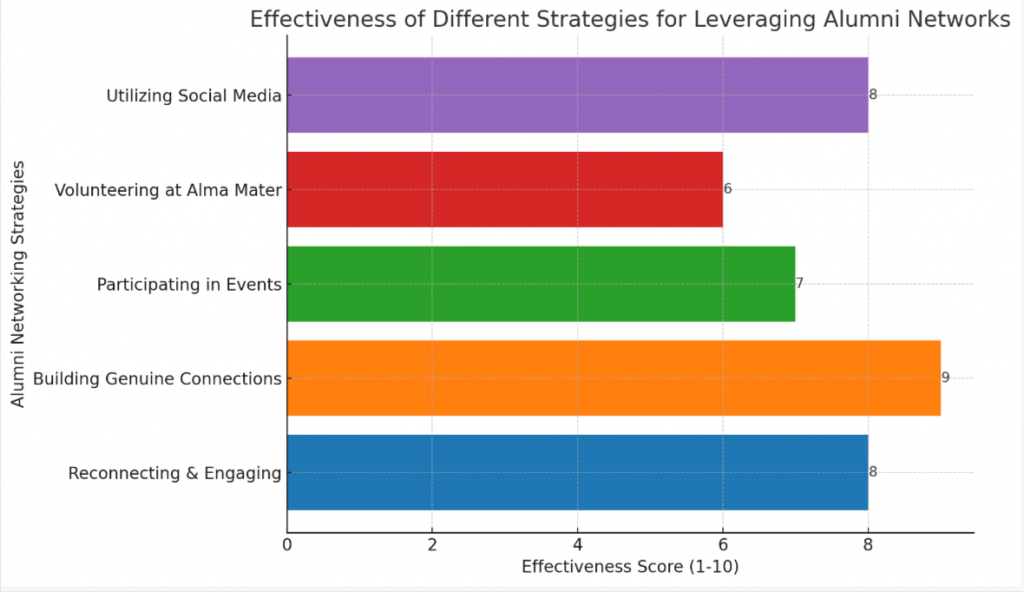Nurturing Academic Ties: Strategies for Using Alumni Networks for Career Advancement
Navigating the career world can be a daunting task, especially when you’re not sure where to start. Did you know that your university or college alumni network could provide significant opportunities for professional growth? This article offers insightful tips and strategies on how to tap into this valuable resource for optimal career advancement.
Ready to unlock a treasure trove of connections and resources? Let’s dive in!
Key Takeaways
- Your alumni network can provide significant opportunities for professional growth, including access to job opportunities, industry insights, and potential mentors.
- Reconnecting with your school and engaging with alumni are key strategies for leveraging alumni networks for professional growth.
- Building genuine connections, maintaining contact, participating in alumni events, and volunteering at your alma mater are effective ways to leverage alumni networks for career advancement.
- Social media platforms like LinkedIn and Twitter can play a crucial role in connecting with alumni and expanding your professional network.
Understanding the Value of Alumni Networks
Alumni networks are fertile ground for building professional relationships and exploring fresh perspectives. These networks, rooted in the shared experiences of school or university life, create an immediate common thread that can make networking feel more natural.
Often managed by approachable alumni committees, they offer a ready-made platform to connect with skilled individuals who share your educational origins.
Further highlighting their value is the role they play in broadening one’s professional reach. Being part of an alumni network offers access to job opportunities, industry insights, and potential mentors within your field of interest.
This community serves as a guiding hand during vocational decisions while also creating avenues for career growth. Thus, harnessing these benefits involves actively participating in events both online and offline and genuinely engaging with fellow members.
Strategies for Leveraging Alumni Networks for Professional Growth
Reconnecting with your school and engaging with alumni are key strategies for leveraging alumni networks for professional growth.

Reconnecting with your school
Reconnecting with your alma mater provides an avenue for professional growth and opens up a network of individuals who share similar experiences. Taking the initiative to reach out helps in creating meaningful relationships that could potentially offer career track insights or even job opportunities.
Joining alumni clubs and participating actively in alumni events fosters a long-term relationship with the school while expanding one’s personal and professional front.
While getting involved with on-campus activities may not always be possible, virtual event platforms provide alternatives for staying connected. Many schools facilitate webinars, speed networking sessions, or social lounges where you can interact with fellow alumni.
Engaging in these activities nurtures your connection to the school community, broadening your professional influence and future possibilities.
Engaging with alumni
Engaging with alumni creates a powerful platform for networking opportunities. These connections often yield professional growth, paving the way towards career development. Many institutions offer readily accessible alumni committees, making it simple to initiate contact with former graduates.
By showing genuine interest and asking about an alumnus’s personal experiences or industry insights, meaningful interactions can be fostered. These micro-interactions serve as essential ice-breaking moments in both virtual events and real-world reunions.
So whether it’s online through social media platforms like LinkedIn, Facebook or Twitter or in-person at homecoming events and university gatherings, active participation within your alumni network sets the stage for fruitful future possibilities on both a personal and professional front.
Building genuine connections and maintaining contact
Fostering sincere relationships is a core strategy for leveraging alumni networks. Active networking involves several key steps:
- Reaching out to alumni members initiates the connection process.
- Engaging in open and honest communication facilitates understanding and mutual respect.
- Expressing genuine interest boosts your credibility and creates trust.
- Consistently staying in touch keeps you present within the network and strengthens connections.
- Sharing valuable information or resources reinforces your position as a useful member of the network.
- Seeking mentorship from experienced alumni can provide guidance and open up new opportunities.
Participating in alumni events
Participating in alumni events offers valuable networking opportunities with potential employers and industry experts. By attending these events, students can connect with successful professionals who can provide insights into their career paths and offer guidance on how to achieve their goals.
Alumni events also allow students to showcase their work, receive feedback, and potentially open doors for future career opportunities. Building relationships through active participation in these events can be a stepping stone towards building a strong professional network that can benefit them throughout their careers.
Volunteering at your alma mater
Volunteering at your alma mater is a valuable strategy for leveraging alumni networks and advancing your career. Many institutions have approachable alumni committees that make it easy to reach out to fellow graduates.
By offering your time and skills, you can actively contribute to the success of your school while also building connections with other alumni who share similar interests and goals.
Volunteering allows you to expand your professional network, gain insights into various career paths, and create long-lasting relationships that can open up future possibilities in both your personal and professional life.
The Role of Social Media in Alumni Networking
Social media platforms, such as LinkedIn and Twitter, play a crucial role in connecting alumni and facilitating networking opportunities for career growth.
Using LinkedIn for alumni networking
LinkedIn is a powerful platform for alumni networking. Here are some ways you can leverage LinkedIn to connect with your fellow alumni and enhance your professional growth:
- Create a compelling LinkedIn profile that highlights your education, skills, and experiences.
- Join relevant LinkedIn groups or alumni associations to connect with alumni who share your interests and goals.
- Use the search function on LinkedIn to find and connect with specific alumni from your school or university.
- Engage with alumni by commenting on their posts or sending them private messages to strike up conversations.
- Share your own professional experiences and insights on LinkedIn to establish yourself as an active member of the alumni community.
- Utilize the “ask for advice” feature on LinkedIn to seek guidance from experienced alumni in your desired field.
- Attend virtual networking events or webinars organized by your alma mater through LinkedIn to expand your network.
- Follow company pages of organizations where alumni work to stay updated on potential career opportunities.
Engaging with alumni on other social media platforms
Engage with alumni on various social media platforms to enhance professional growth and expand your career network. Use these platforms as a means to connect, collaborate, and share insights with alumni who share similar interests and goals. Leverage the power of social media by:
- Utilizing LinkedIn: Connect with alumni through this professional networking platform. Join relevant alumni groups, participate in discussions, and reach out to individuals for mentorship or career advice.
- Engaging on Twitter: Follow alumni influencers and industry leaders on Twitter to stay updated on industry trends, events, and job opportunities. Interact with their posts by liking, retweeting, or commenting to establish connections.
- Connecting on Facebook: Join alumni-focused Facebook groups and actively engage in discussions related to career development and industry updates. Share relevant articles or resources that can be beneficial to others.
- Being Active on Instagram: Follow alumni accounts related to your field of interest or industry. Engage with their content by commenting thoughtfully or direct messaging them for further conversation.
The Impact of Alumni Networks on Career Development
Alumni networks play a crucial role in career development, equipping students with essential skills and facilitating real-world work experiences for future success.
Equipping students with career-readiness skills
Alumni networks play a crucial role in equipping students with career-readiness skills. Through these networks, students have the opportunity to connect with successful alumni who can provide valuable insights and guidance regarding their chosen career paths.
Alumni can offer advice on industry trends, share personal experiences, and even provide mentorship opportunities. By engaging with alumni through networking events or online platforms like LinkedIn, students can gain knowledge about professional expectations and develop the necessary skills to excel in their chosen fields.
This exposure to real-world work experiences helps students navigate the job market confidently and prepares them for future possibilities in their careers.
Facilitating real-world work experiences
Partnerships with alumni networks can provide valuable opportunities for students to gain real-world work experiences. These partnerships often lead to internships or job placements, giving students a chance to apply their knowledge and skills in practical settings.
For example, Bournemouth University has implemented course advisory panels that involve alumni and academic staff to enhance the curriculum and provide industry insights. These panels not only strengthen the connection between students and alumni but also offer networking opportunities for students to connect with professionals in their field of interest.
By incorporating alumni knowledge and expertise into the curriculum, universities like Bournemouth highlight the importance of preparing students for successful careers by providing them with real-world work experiences through collaboration with alumni networks.
Conclusion
Leveraging alumni networks for career growth is a valuable strategy to expand your professional reach and gain insights into different career paths. By reconnecting with your school, engaging with alumni, and participating in events and volunteering opportunities, you can build genuine connections that can lead to future possibilities on both a personal and professional front.
Social media platforms also play a role in alumni networking by providing avenues for virtual interactions and expanding your network even further. So take advantage of the power of alumni networks to propel your career forward.

